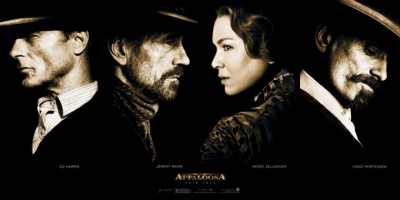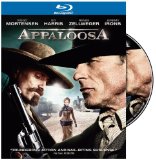| Reviews & Columns |
|
Reviews DVD TV on DVD Blu-ray 4K UHD International DVDs In Theaters Reviews by Studio Video Games Features Collector Series DVDs Easter Egg Database Interviews DVD Talk Radio Feature Articles Columns Anime Talk DVD Savant Horror DVDs The M.O.D. Squad Art House HD Talk Silent DVD
|
DVD Talk Forum |
|
|
| Resources |
|
DVD Price Search Customer Service #'s RCE Info Links |
|
Columns
|
|
|
Appaloosa
Bragg (Jeremy Irons): "Your law?"
Virgil Cole: "Same thing."
A well-above-average Western, fundamentally classical yet peppered with fresh concepts throughout its familiar story, Appaloosa (2008) was directed, co-written by, and stars Ed Harris, his second film in the first capacity since Pollock (2000). Despite a cast not associated with the genre, their look and performances are so on the money you'd think they've all been busy making Westerns for years and years. Modestly produced for $20 million (chicken feed in today's high concept Hollywood) the film seems to have fared okay if unspectacularly at the box office, yet comes to home video barely three months after its premiere.
The New Line / Warner Home Video Blu-ray predictably is up to contemporary standards in terms of the transfer and the audio, and there's the usual assortment of audio commentaries, deleted scenes, and VAM (value-added material) featurettes.
Set in New Mexico Territory in 1882, Appaloosa is small town where powerful rancher Bragg (Jeremy Irons, an obvious but effective choice) has murdered the town's sheriff and his two deputies in cold blood and disposed of the bodies. In response, Appaloosa's leaders (James Gammon, Timothy Spall, and Tom Bower) hire lawman Virgil Cole (Ed Harris) and Everett Hitch (Viggo Mortensen) as their new city marshal (misspelled "Marshall" on the sign over their office)and his deputy.
The new marshal's style is quickly established in a confrontation with three of Bragg's men, whom Virgil and Everett find pissing in front of the bar at the local saloon. Virgil tells them to stop, that they're under arrest and if they resist he'll shoot them. They resist, and without hesitation he and Everett brutally shoot them dead.
Meanwhile, aboard the local stagecoach comes Allison (Renée Zellweger), neither a whore nor a schoolmarm, but rather a recent widow with no income or talent other than a barely passable ability at the piano. (Mild Spoilers) Virgil is smitten and the two quickly marry, though it soon becomes apparent to Everett that, probably out of a desperate, insatiable need to feel financially secure and looked after, Allison is incapable of truly committing to any one man. Meanwhile, the stakes with Bragg are raised when one of his ranch hands comes forward with an offer to testify against his former boss in a murder trail. But bringing Bragg to justice proves no easy task.
As one might expect from a film directed and co-written by Ed Harris, one of the best actors of his generation, Appaloosa is intelligent and character-driven, and like most actor-directors, he pulls fine, thoughtful performances from his cast. A favorite since George Romero's oddly endearing Knightriders (1981) and especially after his superb performance as Mercury Astronaut John Glenn in The Right Stuff, Ed Harris has since appeared in a wide range of films, some worthy of his talent, others not. With Pollock and other projects, he seems to have taken greater control over his career, which is probably a good thing. He's not the first person you'd think of to headline a Western, yet both he and Mortensen (with his gaunt features and Buffalo Bill whiskers) look exactly right. Harris, an intense actor where one can read all the conflicting emotions of his characters on his subtly expressive face, is excellent as the direct, no-nonsense city marshal.
There's some interesting political content in the film in that before agreeing to the job Virgil insists upon absolute control over Appaloosa. So terrified are the town's leaders of Bragg and his men they readily put a brutal gunfighter in charge, a violent man with a short fuse, a man who's as apt to beat an ordinary citizen to a pulp for talking too loud ("a man so mean he once shot a man - just for snoring!"). It's an interesting characterization. Virgil doesn't have full control over his sudden bursts of brutality, but he's intelligent enough to walk away from it most of the time, and to channel it through his chosen profession.
Everett also realizes Virgil's shortcomings, but admires his directness. In one scene, Virgil casually tells Allison that he never lies. This is not out of a Galahad-type pureness (then again, consider his name), but rather for Virgil telling the truth all the time simply makes more sense. Why bother with the hassle of subterfuge? Tell it like it is, speak plainly he seems to say. Significantly, Bragg and Allison both lie rather outrageously to Virgil, and he's as much confused as disappointed by their deceptions.
The film bears some resemblance to the much-underrated, unjustly-maligned Tombstone (1993) and the miniseries Lonesome Dove (1989) in terms of its depiction of male camaraderie, the bonds between cowboys and gunfighters who spend more time with one another than the casual relationships they have with various prostitutes and Indian squaws. It's also like those films in terms of its period authenticity and leisurely pace, where there's a lot of time for reflection between infrequent, sudden bursts of extreme violence. Later in the film Lance Henriksen (who played Wally Schirra in The Right Stuff) makes a welcome appearance as a crack gunslinger, superior even to Virgil.
Less successful is Zellweger's character, whose complexities don't really get the screentime they need. She's fine, despite being a last-minute replacement for Diane Lane, who might have been better in some ways but would unavoidably have invited further comparisons to Lonesome Dove, in which she starred with Robert Duvall.
Harris reportedly wanted to make the film in a classical Western style, and that's pretty much what's onscreen. In all respects the film strikes a comfortable balance between this classicism and contemporary cinematic story-telling -- most notably in Jeff Beal's (Pollock, Monk) score, which manages to sound a little bit like a lot of different Westerns, including even spaghetti-esque at times, yet in the end sounds original and not derivative. Also noteworthy is the imaginative end title design.
Video & Audio
Filmed in Panavision with theatrical prints by DeLuxe, Appaloosa is presented in its original 2.40:1 format in an expectedly excellent transfer that shows DP Dean Semler's (Dances with Wolves, The Alamo) cinematography to good advantage. In 1080p on a BD-25, the understated use of color, low- source-lighting style of the interiors, etc., all come off well, as do the exterior vistas used functionally rather than for their picturesque quality. A standard-def DVD copy of the film is also included.
The audio, originally Dolby Digital, SDDS and DTS in selected theaters, is offered here in both Dolby TrueHD 5.1 and Dolby Digital 5.1 (English only). Optional English and Spanish subtitles are included. The mix is, again, up to current standards, with much directionality in terms of the sound effects. The film has the Shane-like effect of being quiet and low-key most of the time so that when there's gunfire, the blasts of pistols and shotguns are really effectively jolting for the audience.
Like other Warner Home Video Blu-rays, Appaloosa commendably doesn't force the viewer to wade through a sea of FBI and Interpol warnings, unasked-for previews and other miscellanea - just stick the disc in and the movie starts right up. Another nice feature is that you can hit the "stop" button and restart the film later without having to reload the entire disc.
Extra Features
Included are the usual supplements one finds in most current titles: in this case, an informative audio commentary by Ed Harris and co-producer/co-screenwriter Robert Knott, deleted scenes with optional commentary, and four standard featurettes: Bringing the Characters of 'Appaloosa' to Life, Historic Accuracy of 'Appaloosa', The Town of Appaloosa, and Dean Semler's Return to the Western. The deleted scenes are in high-def.
Parting Thoughts
Though it falls short of perfection, I dearly wish Hollywood made a lot more movies like Appaloosa: a suspenseful, character-driven Western made by intelligent, tasteful people for an adult audience. Highly Recommended.
Film historian Stuart Galbraith IV's latest book, The Toho Studios Story, is on sale now.
|
| Popular Reviews |
| Sponsored Links |
|
|
| Sponsored Links |
|
|
| Release List | Reviews | Shop | Newsletter | Forum | DVD Giveaways | Blu-Ray | Advertise |
|
Copyright 2024 DVDTalk.com All Rights Reserved. Legal Info, Privacy Policy, Terms of Use,
Manage Preferences,
Your Privacy Choices | |||||||














